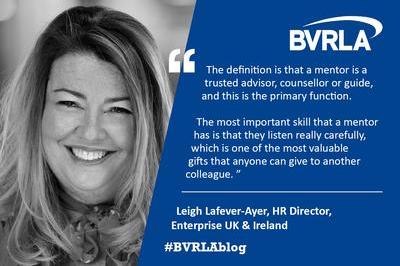In this blog, part of our People and Skills Week and published on International Women's Day 2023, Leigh Lafever-Ayer, HR Director Enterprise UK & Ireland shines the spotlight on mentoring, observing that it can boost the skills of the mentor as well as the mentee.

As a business that promotes from within, mentoring is a strategy that we’ve used both formally and informally. It helps people to develop more effectively, build confidence and get the support they need to step up in their current and future roles.
A hidden benefit is that it also boosts the skills and competencies of the mentor. Guiding and counselling others develops leadership skills, and mentors in turn demonstrate their willingness to take on greater responsibilities.
Some of the misconceptions is that you must be very senior and very experienced to be a mentor. This is not correct, though more experience can be beneficial.
Another is that you have to do the same job – also not a requirement, though it can be useful to help people progress. My last two formal mentees have been from another division in the company.
The definition is that a mentor is a trusted advisor, counsellor or guide, and this is the primary function.
There may be some sharing of knowledge, more formal teaching or coaching through mentoring, but that is not a primary requirement.
In fact, sometimes it can be beneficial to get a mentor from a completely separate background.
The most important skill that a mentor has is that they listen really carefully, which is one of the most valuable gifts that anyone can give to another colleague.
One of our mentors said, “The objective is to listen, provide a new/different perspective and help guide them into their desired direction.”
Our mentors also often tell us that they become friends, which is a really important aspect of feeling that you belong in a workplace.
So, I want to examine those two options a little bit more closely – formal and informal mentoring programmes:
Formal mentoring
This was launched at our European headquarters in 2017 by our Enterprising Women committee. It was open to all our campus employees, and we chose to connect them with mentors based on skills and experience.
It was a voluntary programme, and we communicated it through a range of channels to encourage people to take part.
How you communicate is important. People need to trust that there are no hidden agendas, and that it is as okay to ask for a mentor as it is to say that this isn’t for me.
The programme has grown rapidly, with more and more mentoring partners participating this year.
Because it is a formal programme, there was a team in place that helped to match mentors with mentees. They were on hand to advise and provide information and support along the way.
However, the mechanics are very simple, which is why mentoring is such a powerful tool for organisations of any size.
Once the mentor and mentee are matched, they meet, either virtually or in person, on a regular basis, typically for about an hour and around once a month, for a conversation.
They may take some notes to set some goals and review progress at the next meeting, but that’s it. There’s no equipment, no costs and a fairly small investment of time. It’s a powerful strategy!
Another advantage of the formal programme is that we have been able to track results in terms of both level change promotions and same level promotions.
Informal mentoring
This thrives at Enterprise because we focus employees on planning their career path almost from day one and we emphasise the importance of building a network, especially among people who have the job you want.
Our line managers are assessed on their ability to develop their employees, and mentoring is one of the key tools that we encourage them to discuss with their teams.
As a result, many employees set up their own mentoring relationships, often with more than one mentor at a time.
There are a few other points that I want to raise as they are important aspects of creating a great team:
Mentoring fosters diversity
This is especially true into the more senior ranks of the business. All of our most senior directors are now mentors to at least one other employee. We focus on mentoring people that are different from us, diverse candidates working their way up the organisation.
Mentoring is now something that we discuss at all senior performance appraisals.
Mentoring goes both ways
One of our Assistant Managers established a successful reverse mentoring programme in her region, which included our now UK & Ireland MD, Ryan Johnson, and one of our General Managers, Adam Lovelock.
Reverse mentoring is when the mentee is more senior than the mentor. Turning mentoring on its head can be invaluable for senior leaders as it opens their eyes to what is going on ‘further down’ in their organisation.
It helps to create more open discussion between different company levels and diversities, breaking down barriers.
The purpose of this programme was to help more senior leaders understand the challenges facing diverse and especially Black employees joining the business.
It helped to build bridges and foster understanding for why certain employees were keen or less interested in certain roles. It gave senior leadership the insights they needed to develop the business and put the right programmes in place.
I hope that I’ve created the impression that mentoring is a simple, effective and flexible strategy for any business, and that getting it going can be as easy as encouraging people in your organisation to meet and talk.





